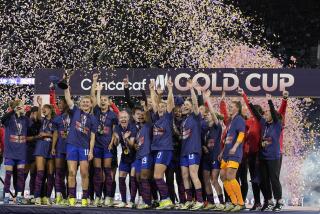Goalie Betsey Armstrong is hub of U.S. Olympic water polo hopes
DALLAS — Betsey Armstrong has an anchor tattooed on her right calf. Why it’s there, though, she’s no longer sure.
“There’s not a really specific meaning behind it,” she says with a shrug. “People ask me all the time if I’m in the Navy. I’m just kind of a water person.”
But Brenda Villa, a teammate on the U.S. women’s water polo team, says the body art has come to symbolize the role Armstrong has grown into over the last four years, becoming the best goalkeeper in the world and the anchor of a team that is a heavy medal favorite in this summer’s Olympic Games.
“She’s our last line of defense,” says Villa, an attacker who has played in every Olympic water polo tournament for women. “She leads by example. She does her job and she does it extremely well.”
Armstrong cemented that reputation in the match that qualified the U.S. for the London Games, making 13 saves in a marathon victory over Canada during last fall’s Pan American Games. Two of those stops came on penalty shots — one in the closing seconds — to keep the Americans’ Olympic hopes alive.
“Huge saves,” Villa recounts from a podium during the USOC Media Summit this week in Dallas. “At that point, when that [penalty] call was made with five seconds left, I was thinking, ‘We’re not going to qualify. We’re going to have to do it another way.’
“When she blocked it, we celebrated like we had won.”
More important, however, is that Armstrong’s last-second heroics helped erase doubts that the U.S. can win the big ones.
The only country to have medaled in all three women’s Olympic water polo tournaments, the U.S. has yet to strike gold — losing to the Netherlands in the 2008 final on Danielle De Bruijn’s goal in the final 26 seconds and to Australia in 2000 when Yvette Higgins scored with 1.3 seconds left in the gold-medal match.
Yet the difference between victory and defeat in each match was much tighter than that, Armstrong says. Which is why beating Canada in another big game could pay off big this summer.
“The margin in those games is so, so slim. So to be able to come out on top, it just takes an unbelievable amount of focus, and we feel really confident for having been able to throw that together in the moment,” she says of the Pan Am Games win, in which the U.S. rallied from a three-goal halftime deficit to force overtime.
The 13 players U.S. Coach Adam Krikorian has chosen for the U.S. team in London will be announced Thursday — not that Armstrong has anything to sweat. But she likes that the 17-woman pool from which Krikorian will be picking is balanced, blending eight former Olympians with four other women ages 21 or younger.
“There’s a great side of us that’s confident and experienced and has played in so many close, major games on that type of stage,” Armstrong says. “And then there’s a young energy that’s kind of like bright-eyed going into this whole thing.”
Armstrong, 29, made her own bright-eyed debut with the U.S. national team in 2006, a year after graduating from the University of Michigan in her hometown of Ann Arbor. A year later she was named the outstanding keeper in the FINA World Championships, and she’s been a fixture in goal ever since, making her the only player on the Olympic team to have attended college outside California.
Not that you’d know it from her tan and shoulder-length blond hair.
“I’ve adapted,” Armstrong smiles.
It took her a while to adapt to the disappointment of the Beijing final, though, where a gold medal seemingly slipped through her fingers. Time has helped heal that wound, and now she says she’s thrilled to have a silver medal — which isn’t the same as saying she intends to settle for second place again.
And that brings us to Armstrong’s other tattoo. It’s on her left arm and it’s of a compass — one she hopes will finally guide her and her teammates to the elusive top step of the Olympic medal podium in London.
“Everybody knows that it’s the one medal that isn’t there,” says Armstrong who, at 6 feet 1, has the thin build and generous wingspan ideally suited to playing in front of the goal. “It would be foolish to say that it isn’t a goal of everybody on the team, But it isn’t our only goal going into the Olympic Games.
“Going into any major tournament you really have to focus on playing one day at a time, knowing that that margin of error can change. And things can change in the matter of two seconds.”
More to Read
Go beyond the scoreboard
Get the latest on L.A.'s teams in the daily Sports Report newsletter.
You may occasionally receive promotional content from the Los Angeles Times.







